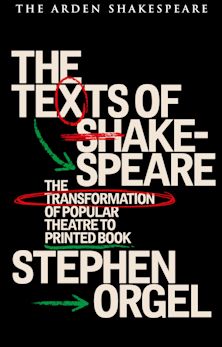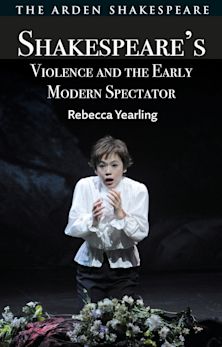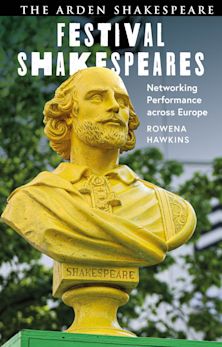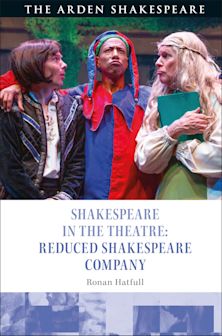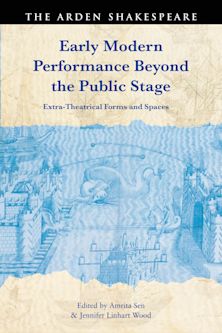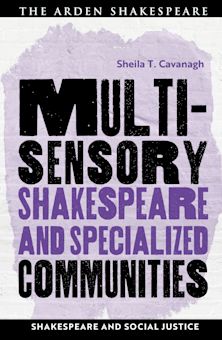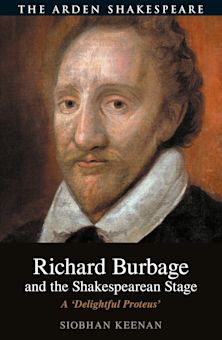- Home
- ACADEMIC
- Drama & Performance Studies
- Shakespeare Studies and Criticism
- Shakespeare's Modern Collaborators
You must sign in to add this item to your wishlist. Please sign in or create an account
Description
Contrary to much recent criticism, this book suggests that modern textual mediators have a positive rather than negative role: they are not simply 'pimps of discourse' or cultural tyrants whose oppressive interventions we need to 'unedit' but collaborators who can decisively shape and enable our response to Shakespeare's plays. Erne argues that any reader of Shakespeare, scholar, student, or general reader, approaches Shakespeare through modern editions that have an endlessly complicated and fascinating relationship to what Shakespeare may actually have intended and written, that modern editors determine what that relationship is, and that it is generally a very good thing that they do so.
Table of Contents
Introduction
1.Establishing the Text
2.Framing the Text
3.Editing Stage Action
4.Editing the Real Lear
Conclusion
Abbreviations
Notes
Index
Product details
| Published | 18 Dec 2007 |
|---|---|
| Format | Ebook (PDF) |
| Edition | 1st |
| Extent | 144 |
| ISBN | 9781441163615 |
| Imprint | Continuum |
| Series | Shakespeare Now! |
| Publisher | Bloomsbury Publishing |
About the contributors
Reviews
-
"This witty, elegant and lucid book gives centre stage to the people who have interpreted and analysed Shakespeare before we read him: the editors. On page after page, Erne's carefully chosen textual examples illustrate not just the purpose but the *value* of editing. A joy to read, this is also an important contribution to our understanding of the way Shakespeare has been mediated to us in the past - and in the present." - Tiffany Stern, Oxford University
-
'Lukas Erne's Shakespeare's Modern Collaborators... argues that of the various modern mediators of the playwright's work, the most important is the modern editor, who makes it possible for readers today to comprehend the text in ways that mirror (not match) those of their early modern counterparts. In doing so, Erne challenges recent perceptions of the Shakespearean editor as either a "harmless drudge" or, citing the "unediting" movement of the past decade, a "harmful 'obfuscator'" who obscures or blocks meaning inherent in the original editions and often advances "sexist and imperialist assumptions" (pp. 4, 5, 9). These are serious problems but they are solved not by no edition but be better editing. The three central chapters examine the range of tasks in establishing the text, such as addressing questions of spelling and punctuation, emending doubtful readings, and inserting act and scene divisions (chapter 1); surveying forms of editorial intervention involving annotation, collation, etc. (chapter 2); and discussing the mediation of stage action (chapter 3). Erne reserves chapter 4 to show how all of these important responsibilities can impact upon a single play, King Lear. The book concludes by discussing the exciting ways in which dedicated editors of the future can provide new generations of readers and spectators with digital editions. This book is timely, lucidly written, and of special value to scholars and students interested in a concisely written and up-to-date overview of play-editing practices.'
Studies in English Literature
-
'Against the ordinary person's vision of the editor as harmless drudge and the rival academic view of the editor as harmful obfuscator (pace Michael Warren or Leah Marcus), this short, dispassionate, lucidly argued volume seeks to illuminate the value of a fully mediated, "fully edited" version of the plays (7). It is worth noting the book's dispassion because while its title nods in the direction of sometimes self-indulgent celebrations of the editor as poetic compatriot (i.e., collaborator), Erne's argument is conspicuous for its moderation. Editors give us a more accessible and (important for Erne, author of Shakespeare as Literary Dramatist) a more readable Shakespeare.'
Medieval and Renaissance Drama in England
-
Erne offers an interesting discussion of the rethinking of the plays' order of composition that must have occurred between publication of the Oxford Complete Works' first edition in 1986 and the second edition of 2005.
The Year's Work in English Studies, Volume 90
-
"Lukas Erne does us a great service by correcting, with such scrupulous care, the Romantic myth that Shakespeare was a solitary genius. This lucidly written analysis makes clear that Shakespeare's work has been shaped profoundly by four sorts of collaboration: co-authorship in quite a few instances, the staging of the plays with fellow actors, the printing process, and the interventions of editors down through the centuries. Erne convincingly defends editing as potentially beneficial and creative in the best sense. What we mean by 'Shakespeare', then, is rich, complex, and ever enlarging in an ongoing collaboration involving the text, the stage, the critic, the reader, and the viewer." - David Bevington, Department of English Language, University of Chicago, USA, Editor of The Complete Works of Shakespeare
David Bevington
-
Mention in Today's Books/ Bookweek

ONLINE RESOURCES
Bloomsbury Collections
This book is available on Bloomsbury Collections where your library has access.
















